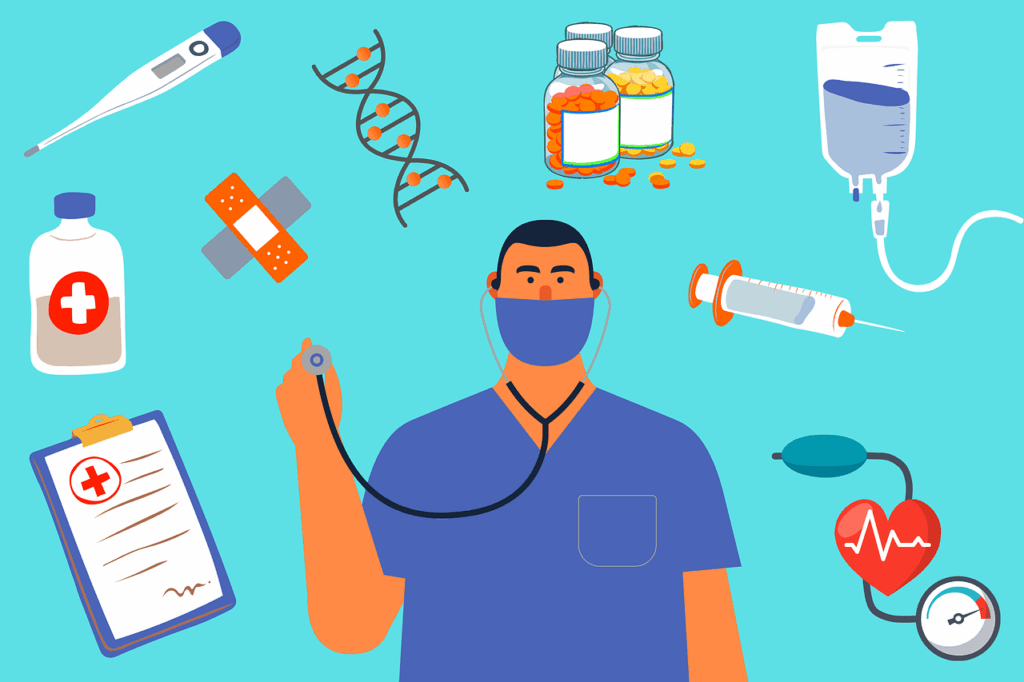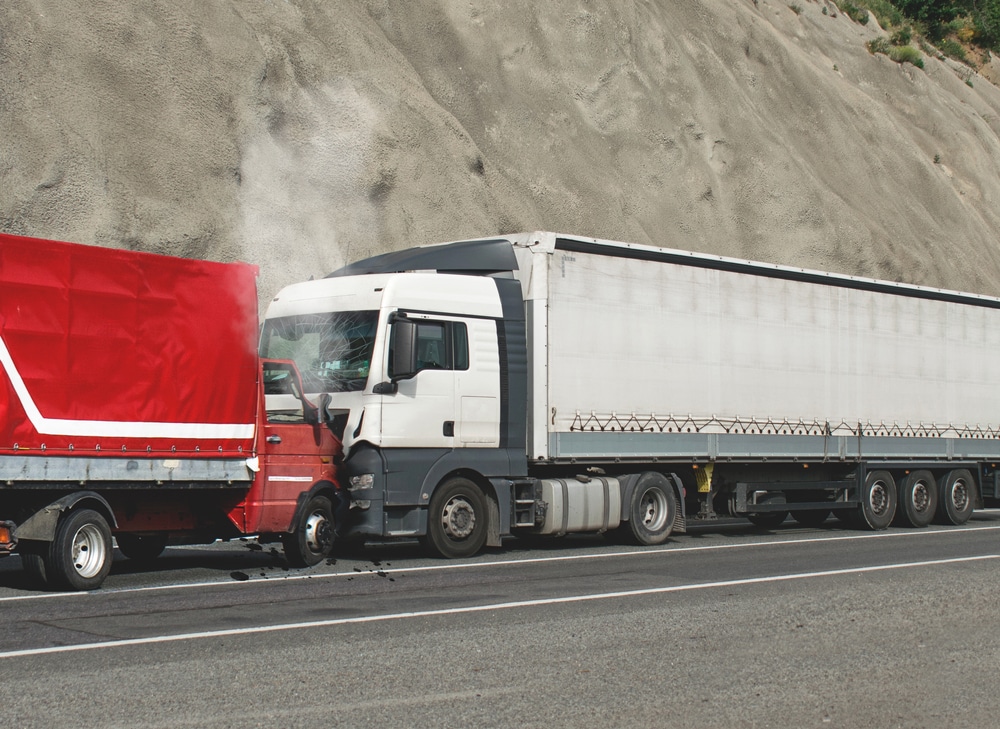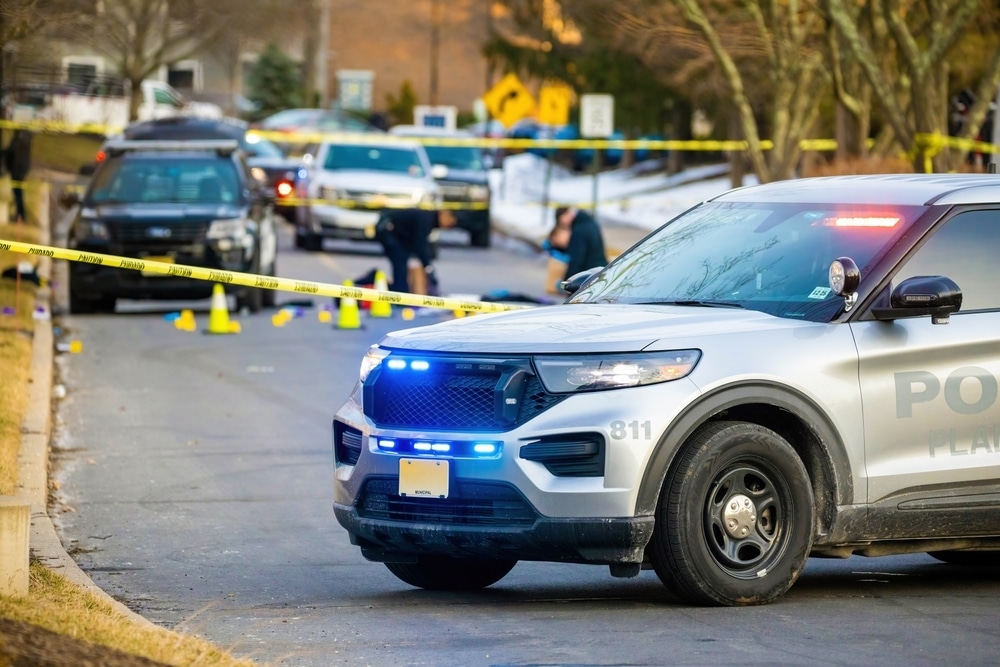Our drunk driving accident lawyer in San Antonio, Texas, can get you the compensation you deserve after your accident. You pay no fees until we win.
Hear from Our Satisfied Clients
Areas in Greater San Antonio We Serve
How Common Are Drunk Driving Accidents in San Antonio?
Texas has historically ranked among the states with the highest number of alcohol-related traffic deaths. Using data from the National Highway Traffic Safety Administration’s (NHTSA) Fatality Analysis Reporting System (FARS), we can assess the number of deaths in Texas due to alcohol-impaired driving.
The tables below show the total number of fatalities across the state and the number of deaths where at least one party involved had a blood alcohol content (BAC) of .08+.
Texas Drunk Driving Accident Fatalities in 2020
| Total fatalities | 3,876 |
| Fatalities involving a BAC of 0.08%+ | 1,533 |
Texas Drunk Driving Accident Fatalities in 2021
| Total fatalities | 4,498 |
| Fatalities involving a BAC of 0.08%+ | 1,906 |
In 2021, total fatalities increased, as did the number of deaths involving drunk drivers. Equally concerning is that the percentage of alcohol-impaired deaths increased, up from 40% in 2020 to 42% in 2022.
The NHTSA does not publish city-specific data, but using the Texas Department of Transportation’s (TxDOT) Crash Records Information System (C.R.I.S.), we can see how many drunk-driving deaths occurred in San Antonio.
We looked at the number of fatalities in San Antonio in 2021, 2022, and 2023, where the person injury severity was “Fatal” and the BAC was greater than or equal to .08.
| 2021 | 2022 | 2023 | |
| Number of Fatalities | 61 | 72 | 38 |
The number of drunk-driving fatalities was uncharacteristically low in 2023, with alcohol-involved deaths dropping by almost half compared to 2022. This is a welcome result in combatting one of the leading causes of motor accident fatalities on Texas roads — one that is entirely preventable.
What Injuries Do Drunk Driving Accidents Cause?
DWI and DUI accidents can be catastrophic, resulting in severe injuries and fatalities.
Common injuries from drunk driving accidents include:
- Back and spinal injuries
- Traumatic brain injury (TBI)
- Broken bones
- Crush injuries
- Neck injuries
- Concussions
- Amputations
- Soft tissue injuries.
Who Is Responsible for a San Antonio Drunk Driving Accident?
It’s normal to assume that the intoxicated driver is liable for a drunk driving accident in San Antonio. In most cases, the driver is liable, but they may not be the only responsible party.
Multiple parties can be at fault for a DWI accident, including:
- The driver
- The establishment that served alcohol
- Any third parties that may have contributed to the accident
- You.
Texas Dram Shop Laws
Texas law prohibits bars, clubs, restaurants, and other establishments that serve alcohol from serving minors or patrons who are significantly impaired. If they do, and the person served then injures you in a drunk driving accident, you can hold them accountable for their negligence.
However, to successfully claim compensation under Texas dram shop laws, you must prove the server knew — or should have reasonably known — the driver was intoxicated and presented a danger to themselves and others and that their intoxication resulted in harm (the accident that caused your injuries or killed your loved one).
Determining who might be liable for your or your loved one’s DWI accident is crucial for claiming compensation. Our San Antonio drunk driving accident lawyer can investigate your accident to identify liability and explain your rights and options, including how you can still potentially recover compensation even if you’re partly responsible for your crash.
How Much Compensation Can a Drunk Driving Accident Lawyer in San Antonio Secure?
If your personal injury claim is successful, you will receive compensation for your injuries, including your past and future medical expenses and lost wages, pain and suffering, and more. This can provide some sense of relief after a drunk driving accident.
A wrongful death claim compensates surviving family members coping with their loved one’s death for loss of consortium (companionship), funeral expenses, lost income potential, emotional pain, outstanding medical bills, and more.
The damages you can claim and how much you will receive depends on the circumstances of the drunk driving accident, any resulting injuries, the evidence supporting your claim, and the defendant’s insurance company.
The most commonly claimed damages include:
- Medical expenses: For ambulance rides, emergency department visits, hospitalization, X-rays, surgeries, and more.
- Future medical costs: For extensive recovery, further surgeries, and round-the-clock care for long-term disability.
- Rehab and recovery costs: For physical therapy, prosthetic limbs, wheelchairs, walkers, and home adaptations to support independence.
- Lost wages: To cover time off work after a severe accident.
- Future lost wages: For a severe or permanent injury that prohibits you from returning to work or forces a job role or career change because you can no longer do your previous job.
- Non-economic damages: For pain and suffering, loss of consortium, mental anguish, loss of enjoyment, and scarring or disfigurement.
- Exemplary damages: These damages can apply if you go to trial and punish — or make an example of — defendants who have acted with malice or gross negligence.
What to Do If You’re a Victim of a San Antonio Drunk Driving Accident
1. Safety First
Your first step after a drunk driving accident should be to ensure you are safe. If you are in a vehicle, we advise staying put until law enforcement arrives, as moving can worsen your injuries. However, if there is a risk of fire or explosion, you should move quickly but carefully as far from the impact as possible without leaving the scene.
2. Call 911
You must report your drunk driving accident to the police. Crash reports, citations, and charges against the drunk driver can be crucial in any subsequent legal action.
3. Document the Scene
It’s possible to begin gathering evidence immediately after your accident. If you can, take photographs of the collision and your injuries and collect the contact information of any witnesses and others involved in the crash. If you can’t get everything at the scene, your San Antonio drunk driving accident lawyer can help secure the necessary information.
4. Seek Medical Attention
If an ambulance does not take you to the hospital, you should see a doctor as soon as possible after your accident, even if you feel fine. Some injuries — even severe ones — don’t present immediate symptoms.
Seeking medical attention also provides evidence of your injuries and when they occurred, which can prove crucial in a compensation claim. You shouldn’t refuse medical assistance due to financial concerns. You have multiple options for paying for medical bills after an accident. If you have a claim, your drunk driving accident attorney in San Antonio can delay payment until you receive compensation.
5. Speak to a San Antonio Drunk Driving Accident Lawyer
Our San Antonio drunk driving accident attorneys can help you get justice. We’ll investigate your accident, gather evidence, negotiate with insurance companies, and even litigate in court if you choose to go to trial, freeing you to focus on your recovery.
How to Contact Our San Antonio Personal Injury Attorney
We take pride in providing a tailored service that defies the traditional personal injury attorney stereotype.
We offer a free, no-commitment case review so you can learn about your legal options, how much you might be entitled to, and what to expect from the process.
We operate in Texas from our office in central San Antonio. That gives us a vital advantage compared to larger yet impersonal multi-national firms — we know the law and the community. When you visit Patino Law Firm, you’ll find a small team that takes the time to get to know you and treats you like family.
Getting in touch with our legal team is simple and convenient. We’re here around the clock to discuss your case, and we offer multiple ways to connect:
Frequently Asked Questions Our San Antonio Drunk Driving Accident Attorneys Receive
The legal alcohol limit for drivers in Texas is a blood alcohol content of .08 percent. Commercial vehicle drivers are held to a stricter standard, as motorists are more at risk of fatigue from driving long hours and commonly operate heavy, dangerous vehicles like semi-trucks. The legal limit for commercial drivers is 0.04 percent.
Drivers do not need to be legally impaired to be arrested for drunk driving offenses. Police officers can arrest individuals with lower BAC levels if they suspect impairment.
BAC is the medical and legal determination of alcohol in the body as a percentage, commonly measured by blood, breath, or urine. It is calculated in milligrams per 100 milliliters of blood or 210 liters of breath. Therefore, if an individual has a BAC of .08, there is 0.08% alcohol in the blood.
Everyone’s tolerance to alcohol is unique; the general effects of a blood alcohol content of .08 (legally impaired) include fatigue, slurred speech, blurred vision, slow reaction time, imbalance, and impaired judgment. Even those under the legal limit can expect minor impairment in judgment and reduced inhibitions, making driving with any alcohol in the system dangerous.
With a BAC of .11, individuals are legally drunk and typically demonstrate greater levels of motor impairment. The depressive symptoms of intoxication also tend to be more pronounced.
A person with a blood alcohol content of .16-.19 may be in a strong depressive state and experience disorientation and dizziness. At .20, there is an increased risk of nausea or vomiting, and an intoxicated person will likely need support to stand or walk.
At .24-.30, an intoxicated individual will be in a stupor, have little comprehension, and may pass out. Physical and mental function is severely impaired, making accidents highly likely.
Severe alcohol intoxication (.31+) can lead to loss of consciousness, amnesia, acute alcohol poisoning, or death. Individuals with a BAC this high may become comatose or die due to respiratory failure.
Driving under the influence (DUI) and driving while intoxicated (DWI) are often used interchangeably to describe any individual driving after alcohol consumption. However, the two terms have distinct meanings under Texas law,
The courts can give anyone a DWI, but DUI charges are reserved only for minors and qualified drivers younger than 21.
The threshold for a DWI – as per section 49.01(2) of the Texas Penal Code — is as follows:
A person is “intoxicated” if they meet either of the following conditions:
- They do not have the normal use of mental or physical faculties due to alcohol or drugs
- They have a BAC of 0.08 or higher
It’s also worth noting that Texas statute defines DWI as “operating” a vehicle while intoxicated. In Texas, though, the term “operate” is broad. Courts have defined it to include any action to “affect the functioning” of a vehicle in a manner that “enables its use.” By this definition, an individual does not necessarily need to be driving a vehicle to be charged with a DWI.
Unlike a DWI, where the threshold is a BAC over the limit, a DUI is issued when minors have any detectable alcohol in their system.
Texas has a zero-tolerance policy for alcohol in a driver under the age of 21. This policy means that an underage driver does not need to be legally “impaired” to receive a DUI charge — any detectable amount of alcohol is illegal for a person under 21.
Drunk drivers can face criminal charges in Texas. Penalties can vary depending on the type of charge (DWI versus DUI) and whether it is the first offense.
Driving Under the Influence (DUI) Penalties
The first offense for minors under 17 is a Class C misdemeanor punishable by:
- 20-40 hours of mandatory community service
- A fine of up to $500
- A license suspension for up to 60 days
- A mandatory alcohol education class.
The first offense for minors aged 17 to 20 is a Class B misdemeanor punishable by:
- A fine of up to $2,000
- 72 hours to 180 days in jail
- A license suspension for one year.
Second offenses are Class C misdemeanors punishable by:
- A fine of up to $500
- 40 to 60 hours of mandatory community service
- A license suspension for 180 days to two years
- A mandatory alcohol education class.
A third offense is classified as delinquent conduct by a minor, with penalties including:
- A fine of up to $500
- 40 to 60 hours of mandatory community services
- A license suspension for 180 days to two years.
Driving while Intoxicated (DWI) Penalties
A DWI is a more severe charge than a DUI, and penalties can range from large fines and driver’s license suspension or revocation to jail time.
The Texas Penal Code governs DWIs issued to anyone of any age who has a blood alcohol content (BAC)* of 0.08 or higher or is demonstrably impaired. The standard first offense DWI is a class B misdemeanor.
First offense:
- A fine of up to $2,000
- Up to 180 days in jail with a mandatory three-day minimum term
- A license suspension for up to one year.
Second offense:
- A fine of up to $4,000
- A jail term or one month to one year
- A license suspension for up to two years.
Third offense:
- A fine of up to $10,000
- A jail term of two to ten years
- A license suspension for up to two years.
Additional penalties can apply depending on the nature of the accident.
Individuals convicted of a DWI with a passenger under 15 in the car face a fine of up to $10,000, up to two years in prison, license suspension for 180 days, and child endangerment charges.
If an intoxicated driver kills a person in a DUI or DWI accident, the police can charge them with intoxication manslaughter. This is a second-degree felony that carries a prison term of two to 20 years and a fine of up to $10,000.
Civil Penalties
A victim of a drunk driving accident in San Antonio can file a civil lawsuit to hold the person or party that caused the accident (including bars or party hosts under dram shop and social host laws) responsible for their pain, suffering, and economic losses.
The family of a loved one who died in a drunk driving accident can file a wrongful death lawsuit. A criminal court does not have to find the drunk driver guilty of intoxication manslaughter for you to pursue and win a civil claim, as the burden of proof is higher in criminal proceedings.
Officers use a variety of field sobriety tests to check for signs of intoxication in drivers. Which test or tests to give is at the officer’s discretion.
DWI task force officers usually perform three tests:
- Horizontal Gaze Nystagmus (HGN): The officer takes a pen and moves it across a person’s face, having the person follow the pen with their eyes.
- Nine-step walk-and-turn: The officer observes the person as they walk heel-to-toe.
- One-legged stand: This tests a person’s sense of balance.
If an officer determines a driver is intoxicated, they are arrested and asked to take a breath or blood test.
The most important thing to do after a drunk driving accident is to ensure you’re safe.
Seek medical attention right away. If an ambulance does not take you to the hospital, you still need to get checked by a doctor as soon as possible. Some injuries, even serious ones, don’t have immediate symptoms.
Documenting your injuries can also benefit you if you claim compensation, as they prove when your injuries occurred. You should never refuse medical assistance due to financial concerns. You can recover these costs if you win your case, and a San Antonio drunk driving accident attorney can help you finance any immediate treatment costs or delay payment until your claim is resolved. Your health and safety always come first.
You’ll likely hear from an insurance adjuster after your accident. Their intentions are two-fold: to glean information they can use against you to reduce your entitlement or dismiss your claim entirely and to offer you a settlement to drop the case.
Unfortunately, any settlement offered at this stage is unlikely to be fair. It may not be enough to cover your expenses, especially if you need additional medical treatment or can’t work.
You should never negotiate with an insurance company without a lawyer. Our drunk driving accident attorney in San Antonio is a skilled advocate who knows how to communicate with insurance companies.
If an insurance adjuster visits the hospital to offer you a settlement (likely when you need it most), you should speak to a lawyer before signing any agreement. If they ask questions about your accident or injuries, politely decline to answer without your attorney and state that you’re still seeking treatment and cannot comment.
It’s vital not to rush into a settlement until you understand the full extent of your injuries and how they might impact your life. A seemingly minor injury can progress to something more severe, and you’ll want a settlement that compensates you for any lasting harm you might endure. A lawyer can help you obtain a full evaluation of your injuries to ensure you get the compensation you deserve.
Drunk driving can play a role in any auto collision, from head-on truck accidents to rear-end car crashes. However, some of the most common in San Antonio are:
Pedestrian Accidents
Drunk driving is a major cause of pedestrian accidents. Pedestrians are especially vulnerable when walking down the street, and the impact of a high-speed car operated by a drunk driver can have severe, even deadly, consequences.
Drunk drivers might ignore traffic lights at pedestrian crossings, veer off marked roadways, and hit pedestrians on sidewalks or street corners.
Head-On Collisions
Head-on collisions involving drunk drivers typically result in catastrophic injuries and significant property damage. Alcohol impairs vision, motor abilities, reaction times, rational thinking, and consciousness, leading drivers to miss traffic signs and potentially drive into oncoming traffic. This type of car accident is extremely dangerous, and the faster either vehicle is moving, the worse the outcome.
Rear-End Collisions
Rear-end car accidents can occur due to tailgating or sitting in a larger vehicle’s blind spot. Alcohol affects vision, making it harder for drunk drivers to judge distance and speed. Rear-end accidents commonly happen when drunk drivers follow too closely because they cannot accurately perceive the vehicle ahead. If that vehicle brakes for a stop light or at an intersection, the drunk driver may hit them as their reaction time is significantly slower.
Hit-and-Run
A drunk driver who leaves an accident scene can be charged with two crimes: DWI and hit-and-run. Claiming compensation after a hit-and-run accident in Texas can be more challenging, especially if you did not get a good look at the drunk driver before they fled. Fortunately, there are several things a drunk driving accident attorney can do to identify the person responsible and build a case against them, including speaking with witnesses who may have seen what type of vehicle they were driving and the direction they headed and viewing traffic cam footage of the local area.
Passenger Collisions
Passengers riding with a drunk driver — including ride-share drivers — and injured in a collision can potentially file a civil claim against the driver. Sometimes, passengers may be partially responsible for their injuries, such as if they knew the driver was intoxicated and still chose to ride in the car or handed them the keys.
Wrongful Death
Losing a family member is devastating, especially when it’s preventable. The compensation you can recover for your loved one’s wrongful death depends on several factors, including their age and the extent of negligence or recklessness by the responsible party. Wrongful death compensation can include mental anguish endured by the family, funeral costs, outstanding medical expenses, and lost income potential. It’s also possible to recover exemplary damages — also known as punitive damages — when your loved one’s death is due to another party’s willful act, omission, or gross negligence.
The drunk driver is still liable for compensating you — regardless of whether they have car insurance. However, you should consider why the drunk driver doesn’t already have insurance. If they cannot afford it, it’s unlikely they have the funds for a personal injury settlement. Our drunk driving accident lawyer in San Antonio can explore your options after an accident with an uninsured driver, including:
- Placing a lien on the defendant’s property or seizing a portion of their wages.
- Suing another liable party with financial resources, such as the establishment that served the driver (if dram shop laws apply).
- Filing an uninsured motorist claim if you have coverage.
Claiming from the Texas Crime Victims’ Compensation Program to cover any compensation the drunk driver can’t provide (limited to $50,000).
Evidence is the foundation of all successful drunk driving accident claims. Your police report (also called a crash or accident report) can prove critical, showing whether or not a driver was impaired.
When officers respond to car accidents, they will test a driver’s blood alcohol content if they have cause to believe they are impaired and document the results in a written report.
When your crash report shows that another driver tested positive for intoxication, it is much easier to prove liability.
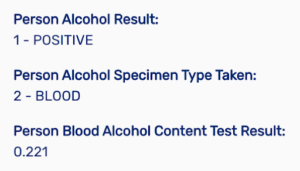 |
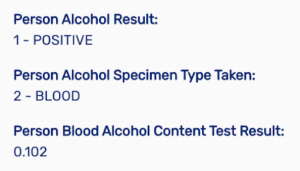 |
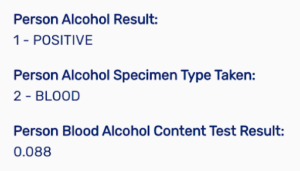 |
Above: Three Texas accident reports showing various blood alcohol content test results. [link to screenshots for upload: D. April 2024 – Google Drive]
That’s because you must prove several elements in a drunk driving claim, including that the driver breached a duty of care owed to you.
Meeting these criteria can be challenging, but a legal doctrine called negligence per se automatically satisfies this burden of proof.
Negligence per se establishes a presumption of negligence because an individual has violated a statute or regulation, such as a traffic law.
As drunk driving is a crime — and a positive BAC test proves the crime has been committed — you can effectively skip the requirement to show a breach of duty, meaning all you need to do is show the accident caused your injuries (for example, by going to the hospital after your crash and documenting your injuries).
The statute of limitations is the time limit to file a complaint against the person or business that caused your injuries or the death of your loved one. In Texas, the personal injury statute of limitations is two years from the day of the crash. This applies whether you are filing a drunk driving accident claim or for wrongful death.
However, there are exceptions. One example is the “discovery rule,” which starts the clock from the date you discovered — or should have reasonably discovered — your injury. This may apply if you sought treatment after your accident, but your injuries were not apparent until years later. The discovery rule is subject to the statute of repose — a strict, unmovable deadline that prevents legal action if it has been 10 years since the accident.
You can file a civil suit even if criminal action is pending against them. Depending on how well negotiations go and whether or not you proceed to court, your claim might be resolved before or after the criminal case.
For example, if the at-fault driver does not dispute liability and offers a fair settlement, your case might be resolved fairly quickly. However, if you file a lawsuit, the criminal case will take precedence in the courts due to the Sixth Amendment right to a speedy trial.
Given the two-year statute of limitations on Texas personal injury claims, it’s best not to wait for criminal charges to play out. With court backlogs, it can take several years to get a trial date, so you risk missing your window to claim compensation.
Drunk driving accidents often cause severe injuries or result in the drunk driver’s arrest, making it impossible for victims to obtain the other drivers’ identifying information immediately afterward. A San Antonio drunk driving accident attorney can gather all necessary information and evidence to support your claim, including the drunk driver’s name, contact information, insurance company, conviction history, and history of alcohol or drug-related issues.
Many parties involved in drunk driving accidents choose to settle rather than decide their case at trial. That doesn’t mean one option is better than the other. What you choose should depend on the specific facts of your drunk driving accident. If the insurance company is unwilling to offer a reasonable settlement, your attorney can file a civil lawsuit and litigate your case. However, if you’re offered fair compensation that covers your past and anticipated losses, there is little reason not to settle.
You should start by negotiating a settlement with the other driver’s insurance company. File a third-party claim against the drunk driver’s car insurance carrier to let them know you seek full compensation for injuries and losses resulting from the accident and see what they offer.
It’s helpful when making your decision to know any prior DUI or DWI convictions against the insured driver. Insurance companies recognize that a lawsuit against someone with a record can be more difficult and costly for them, which may factor into the injury settlement they’re willing to provide.
No matter where you are in the process, speak to a lawyer before agreeing to any offers of compensation.
Many parties involved in drunk driving accidents choose to settle rather than decide their case at trial. That doesn’t mean one option is better than the other. What you choose should depend on the specific facts of your drunk driving accident. If the insurance company is unwilling to offer a reasonable settlement, your attorney can file a civil lawsuit and litigate your case. However, if you’re offered fair compensation that covers your past and anticipated losses, there is little reason not to settle.
You should start by negotiating a settlement with the other driver’s insurance company. File a third-party claim against the drunk driver’s car insurance carrier to let them know you seek full compensation for injuries and losses resulting from the accident and see what they offer.
It’s helpful when making your decision to know any prior DUI or DWI convictions against the insured driver. Insurance companies recognize that a lawsuit against someone with a record can be more difficult and costly for them, which may factor into the injury settlement they’re willing to provide.
No matter where you are in the process, speak to a lawyer before agreeing to any offers of compensation.
Locations We Serve
Our Texas accident attorney has successfully recovered maximum compensation for injured individuals and their families all over the state, from the Rio Grande Valley to the Permian Basin.



